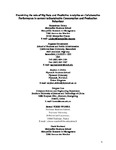Examining the role of Big Data & Predictive Analytics on Collaborative Performance in context of Sustainable Consumption and Production Behaviour
| dc.contributor.author | Dubey, R | |
| dc.contributor.author | Gunasekaran, A | |
| dc.contributor.author | Childe, Stephen J | |
| dc.contributor.author | Luo, Z | |
| dc.contributor.author | Fosso Wamba, S | |
| dc.contributor.author | Roubaud, D | |
| dc.contributor.author | Foropon, C | |
| dc.date.accessioned | 2018-06-10T16:21:16Z | |
| dc.date.issued | 2018-09-20 | |
| dc.identifier.issn | 0959-6526 | |
| dc.identifier.issn | 1879-1786 | |
| dc.identifier.uri | http://hdl.handle.net/10026.1/11633 | |
| dc.description.abstract |
The organizations engaged in sustainable development programmes are increasingly paying serious attention towards synergetic relationships between focal firms and their partners to achieve the goal of sustainable consumption and production (SCP) via big data and predictive analytics (BDPA). The study examines the role of BDPA in collaborative performance (CP) among the partners engaged in sustainable development programme to achieve the goal of SCP. The study further investigates the contingent effect of organization fit on the impact of BDPA on CP. We used variance based structural equation modelling (PLS SEM) to test research hypotheses using a sample of 190 respondents working in auto-components manufacturing organizations in India drawn from the ACMA and Dun & Bradstreet databases. The results indicate that BDPA has a significant positive impact on the CP among partners and the organizational compatibility and resource complementarity have positive moderating effects on the path joining BDPA and CP. The study contributes to the understanding of BDPA and collaboration literature in the context of sustainable development. These findings extend the dynamic capability view (DCV) to create a better understanding of contemporary applications of big data and predictive analytics capability, while also providing theoretically grounded directions to managers who seek to use information processing technologies to continuously improve the collaboration in supply chain networks. We have also noted some of the limitations of our study and identified numerous further research directions. | |
| dc.format.extent | 1508-1521 | |
| dc.language | en | |
| dc.language.iso | en | |
| dc.publisher | Elsevier | |
| dc.subject | Sustainable consumption | |
| dc.subject | Sustainable production | |
| dc.subject | Collaboration | |
| dc.subject | Inter-organizational fit | |
| dc.subject | Resource complementarity | |
| dc.subject | Sustainable operations | |
| dc.title | Examining the role of Big Data & Predictive Analytics on Collaborative Performance in context of Sustainable Consumption and Production Behaviour | |
| dc.type | journal-article | |
| dc.type | Journal Article | |
| plymouth.author-url | https://www.webofscience.com/api/gateway?GWVersion=2&SrcApp=PARTNER_APP&SrcAuth=LinksAMR&KeyUT=WOS:000444364400129&DestLinkType=FullRecord&DestApp=ALL_WOS&UsrCustomerID=11bb513d99f797142bcfeffcc58ea008 | |
| plymouth.volume | 196 | |
| plymouth.publication-status | Published | |
| plymouth.journal | Journal of Cleaner Production | |
| dc.identifier.doi | 10.1016/j.jclepro.2018.06.097 | |
| plymouth.organisational-group | /Plymouth | |
| plymouth.organisational-group | /Plymouth/Faculty of Arts, Humanities and Business | |
| plymouth.organisational-group | /Plymouth/Faculty of Arts, Humanities and Business/Plymouth Business School | |
| plymouth.organisational-group | /Plymouth/REF 2021 Researchers by UoA | |
| plymouth.organisational-group | /Plymouth/REF 2021 Researchers by UoA/UoA17 Business and Management Studies | |
| plymouth.organisational-group | /Plymouth/Users by role | |
| plymouth.organisational-group | /Plymouth/Users by role/Academics | |
| dcterms.dateAccepted | 2018-06-10 | |
| dc.rights.embargodate | 2019-6-14 | |
| dc.identifier.eissn | 1879-1786 | |
| dc.rights.embargoperiod | 48 months | |
| rioxxterms.versionofrecord | 10.1016/j.jclepro.2018.06.097 | |
| rioxxterms.licenseref.uri | http://www.rioxx.net/licenses/under-embargo-all-rights-reserved | |
| rioxxterms.licenseref.startdate | 2018-09-20 | |
| rioxxterms.type | Journal Article/Review |


